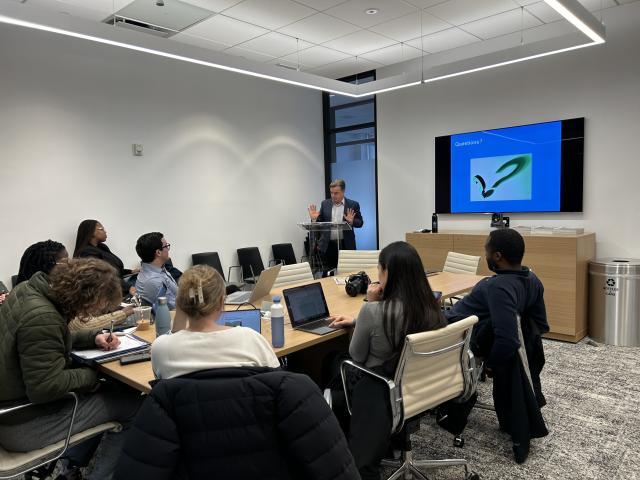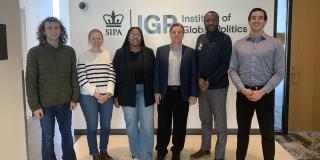
IGP Hosts Skills Workshop on Public Speaking for Future Leaders

One speech can change a career — consider the unknown state senator from Chicago whose oratory at the 2004 Democratic National Convention set him on a glide path toward the Oval Office.
This is the advice of Adjunct Professor James Holtje, who has been in the speechwriting, corporate communications, and adjunct teaching arenas in the United States and overseas for more than 30 years.
He and a small cohort of IGP Student Scholars gathered at the Institute of Global Politics on February 14 for an IGP Skills Workshop on “Building Your Leadership Voice Through Public Speaking.” Attendees listened and learned how blending credibility with reason, storytelling, setting and timing can transform a speech into a persuasive, career-changing event.
“There is a fine line between authenticity and acting,” Holtje told the students, “and you have to find that space where you are your authentic self but that also keeps the audience engaged.”
The rules of thumb for persuading an audience go all the way to Aristotle, Holtje said, laying out the Greek philosopher’s four main ingredients to delivering a powerful speech: ethos (credibility of the speaker), logos (all speeches require logical consistency), pathos (tapping into emotion and tell a good story), and kairos (the setting, timing and other context).
There is a fine line between authenticity and acting and you have to find that space where you are your authentic self but that also keeps the audience engaged.
— James Holtje
Using Holtje’s framework for persuasive communication, students dissected a variety of pivotal speeches by world leaders. Some of the historical addresses they analyzed included the 2004 keynote by not-yet-President Barack Obama, the 1983 Columbia College graduate cited above, and when Tuvalu foreign minister Simon Kofe delivered a speech to COP26 while knee-deep in water.
Holtje said the rules for delivering a good speech apply whether one is entering public office or working in the private sector. In both cases, it helps to tell a powerful story.
“Most presentations in the private sector are unfortunately very dry and are heavy on analytics.” Ordinary people, he said, “don’t remember the numbers, they remember the stories.”

On the basic etiquette of delivering a speech at a podium, Holtje advised having both feet planted and hands gently resting on the podium. If using hand movements while speaking, they should be symmetrical and never point fingers at the audience.
Holtje also recommended having the printout of a speech covered in a plastic sleeve inside a three-ring binder to avoid getting wet or swept away by wind.
When using note cards, it is helpful to have it all in one card so that, if dropped, the speaker can easily pick up where they left off and not worry about having to reorder the shuffled notecards.
Many of these tips made sense to the future leaders attending the workshop.
Jay Stout, a second year International Security Policy student at SIPA and IGP Student Scholar, said he aspires to run for state senate in New York. “This workshop helped me better understand communication and how to properly address small and large crowds so I can convince them to vote for me,” Stout said.
“Any career in the public service is going to involve communicating ideas effectively,” said Nicole Sims MPA ’24, an IGP Student Scholar who is concentrating in Urban and Social Policy at SIPA. “Learning about the narrative process was great because it is not always about having a good idea but also how you are able to communicate it in a meaningful way.”
When asked about how to deliver a speech over Zoom, Holtje said speakers should always look at the camera. This gives the illusion of looking into the other person’s eyes, he said, which will help connect with the audience and develop a sense of trust.
Holtje closed the workshop by encouraging students to meditate and take a few deep breaths before a speech to help ground them and calm any nerves.